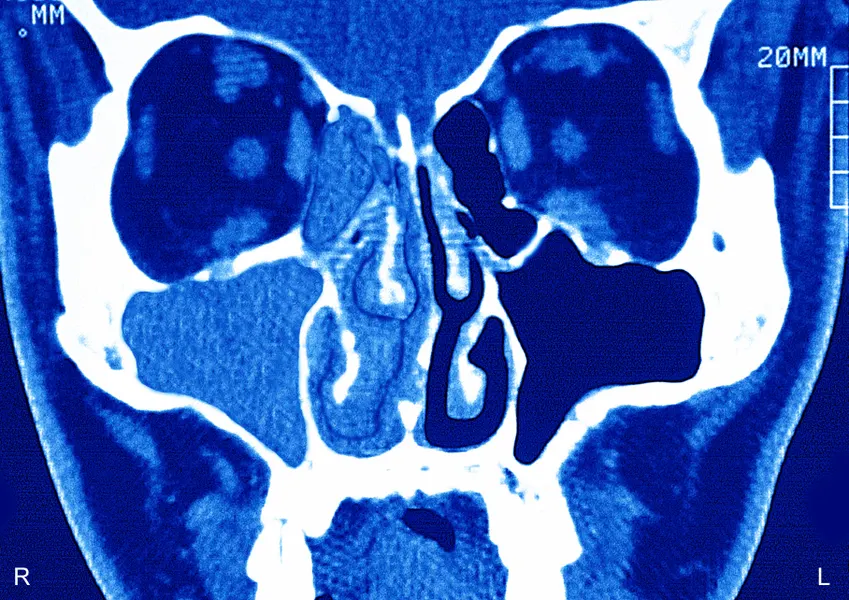How to Tell If a Sinus Infection Has Spread to the Brain: Symptoms, Risks, and What to Do
Sinus infections, also known as sinusitis, are common and usually affect the sinus-a place filled with air around the nose, eyes and cheeks. Most people recover from sinusitis using rest, hydration and sometimes antibiotics. In rare cases, however, a sinusitis can spread over sinuses, possibly leading to serious complications. One of the most related to potential complications is when a sinusitis has spread to the brain, causing serious health problems.
What is a Sinus Infection?
A sinusitis or sinusitis occurs when the sinuses – the cavities of your skull that produce mucus – become inflamed due to an infection. This inflammation may be caused by a variety of factors, including viral, bacterial or fungal infections. Most sinus infections are short -started and solve on their own, but they can cause significant discomfort including nasal density, facial pain and pressure.
Sinus infections are typically categorized as:
- Acute sinusitis: Symptoms last less than 4 weeks.
- Subacute sinusitis: Symptoms last 4-12 weeks.
- Chronic sinusitis: Symptoms persist for more than 12 weeks.
- Recurrent sinusitis: Several episodes occur within a year.
The infection usually begins in the sinus and can cause symptoms such as headaches, nasal density, sore throat, post -salt drip and fever. However, if the treated is not done or administered properly, the infection can spread over the sinus, leading to the complications that affect the structures including the brain.
Read about: Dengue Fever in Pasco Florida: What You Need to Know and How to Stay Safe
How Does a Sinus Infection Spread to the Brain?
Your sinuses are close to your eyes, cheeks and pans. They also have important structures including the brain. Although it is unusual for sinusitis to spread over sinuses, the risk increases if the infection is not treated or severely.
The sinus infection can spread to the brain in a few ways:
- Direct Extension: The infection can spread directly through thin bones that separate the sinus from the brain.
- Bloodstream Spread: The infection can enter the bloodstream and spread to other areas including the brain.
- Nearby Structures: The infection can travel to adjacent structures, such as the eyes (as a result of orbital cellulite), and further develop into the brain.
The most common brain complications of a sinusitis are brain boils, meningitis and cavenus sinus language. These complications can be life -threatening and require immediate treatment.
How to Tell If a Sinus Infection Has Spread to the Brain?

If you have a sinusitis, it is important to know about the warning sign that the infection can spread to the brain. Although rare, these complications can cause serious health problems. The following are the most important symptoms that may indicate that the infection has spread beyond the sinus:
1. Severe Headache
One of the first symptoms that may indicate infection is a severe headache. Although headaches are a common symptom of sinusitis, a sudden and acute headache that feels different from your specific sinus headache may be indicated, it is indicated that the infection has affected the brain.
If the headache is persistent and with others related to other symptoms, it is important to be immediate medical attention.
2. Fever and Stiff Neck
A high fever combined with a stiff neck may indicate that the infection is spread in the protective membrane, meaning around the brain and spinal cord. This condition is known as meningitis, and it can cause severe neurological damage when not treated.
Symptoms of meningitis include light, nausea, vomiting and sensitivity to confusion. If you experience any of these symptoms along with sinusitis, it is important to find medical treatment.
3. Changes in Mental Status
If a sinusitis spreads to the brain, this may be the cause of changes in your mental state. This may also include confusion, difficulty focusing, irritability or loss of consciousness. These symptoms may indicate that brain books or meningitis and require immediate treatment.
4. Seizures
Seizures are another serious symptom that can lead to a result of sinusitis spreading in the brain. A seizure occurs when the brain has abnormal electrical activity, resulting in uncontrolled shock, confusion or loss of consciousness.
Seizures require emergency treatment, and if you experience one with sinusitis, it is important to get medical help.
5. Vision Problems
Vision problems such as double vision, blurred vision or full vision can occur if the sinusitis spreads into the orbital cavity. Infection can cause pressure on the eye, cause conditions such as orbital cellulite or even cavernous sinus thrombosis.
If you notice the changes in your vision or significant eye pain along with sinusitis, it is important to give a doctor as soon as possible.
6. Severe Facial Pain
Serious and aggravated facial pain, especially around the eyes, cheeks and pans, may indicate that the infection has spread to nearby structures, such as the eye contact or brain. This can be a sign of an abscess or other serious complications.
7. Nausea and Vomiting
If the dinus infection is accompanied by nausea and vomiting, it may be a sign that the infection has affected the brain, especially if these symptoms persist or worsen over time. Vomiting can occur with meningitis or brain boil, and other neurological symptoms may occur.
What Are the Risk Factors for a Sinus Infection Spreading to the Brain?
While most sinus infections do not spread in the brain, a certain risk factor can increase the possibility of complications. This includes:
- Chronic Sinusitis: Long -term or untreated sinusitis may be at risk of spreading infection.
- Weakened Immune System: A person with a compromised immune system (such as HIV, cancer or immunosuppressive medications) is at greater risk of complications.
- Nasal Surgery or Trauma: Any surgery or damage to the sinus or nasal cavity may increase the risk of brain infection.
- Fungal Infections: Mushroom sinus infections can sometimes spread more easily in the brain than bacterial infections.
- Delayed Treatment: Not requiring timely medical treatment for a sinusitis can allow the infection to move forward and spread to the surrounding areas.
Complications of a Sinus Infection Spreading to the Brain

If a sinus infection does spread to the brain, it can lead to several severe complications:
- Brain Abscess: A brain -abscess is a pocket of pus formed in the brain as a result of infection. This can cause neurological damage and usually require immediate treatment with antibiotics or surgery.
- Meningitis: Maningitis is inflammation of the mening (protective layers around the brain and spinal cord). It can cause inflammation, brain damage and even death if it is not treated immediately.
- Cavernous Sinus Thrombosis: This rare but severe complication occurs when a blood clot forms in a large vein at the bottom of the skull. It can cause severe inflammation around the eyes, headaches and neurological problems.
- Sepsis: If the infection spreads in the bloodstream, it can cause sepsis, a life -threatening condition that requires immediate medical intervention.
What to Do If You Suspect a Sinus Infection Has Spread to the Brain?
If you experience any of the symptoms mentioned above, it’s important to act quickly. Here’s what you should do:
- Seek Immediate Medical Attention: If you suspect that the dinus infection has spread to the brain, you can go to the emergency room or take care immediately. Early treatment can prevent further complications.
- Diagnostic Imaging: Your health care provider can use CT scan or MRI to diagnose the infection area and decide whether it has spread to the brain or other areas.
- Treatment: Depending on the severity of the infection, treatment may include antibiotics, fungicidic medications or surgery to drain the cups or to clean the infection from the sinus.
How to Prevent Sinus Infections and Complications
Prevention of sinus infections and ensure that they do not proceed to more serious complications can be achieved through the following steps:
- Good Hygiene: Wash your hands regularly and avoid close contact with sick people.
- Manage Allergies: Allergies can increase the risk of sinusitis, so keep them under control of medication or lifestyle changes.
- Hydration: Stay well-hydrated to help thin mucus and promote sinus drainage.
- Seek Timely Treatment: If you have a sinusitis, do not delay the demand for medical treatment. Early treatment can help prevent complications.
Conclusion
Although it is rare to spread to the brain for a sinusitis, it is necessary for your health to understand the symptoms and risk associated with this progression. If you experience severe symptoms such as headaches, fever, confusion or vision problems, attract the attention of therapy immediately. Early diagnosis and treatment are important to prevent potential complications with life.
By requiring informed and timely care, you can reduce the risk of spreading sinusitis and ensuring rapid improvement. If in doubt, do not hesitate to contact your health care provider – your health is worth it.
FAQS
- How do I know if my sinus infection has spread to my brain?
There are indications that a sinusitis can spread to the brain, including severe headaches, a stiff neck, confusion, seizure, visual problems and fever with nausea. If you experience these symptoms, you must immediately pay attention.
- What are the risks of a sinus infection spreading to the brain?
If a sinusitis spreads to the brain, it can give rise to severe complications such as brain abscess, meningitis, cavernus sinus thrombosis or sepsis, all of which require immediate medical treatment.
- Can a sinus infection cause brain damage?
Yes, if a sinus infection spreads to the brain, it can cause significant damage, particularly through conditions like meningitis or brain abscesses, which can result in long-term neurological issues if not treated promptly.
- How quickly can a sinus infection spread to the brain?
Although rare, a sinusitis can spread to the brain within a week within a week if it is not treated or if the infection is severe. It is important to find early treatment to prevent complications.
- What should I do if I suspect my sinus infection has spread to my brain?
If you suspect that a sinusitis has spread to your brain, you must immediately provide medical attention. Early diagnosis through imaging and early treatment can prevent serious complications.








